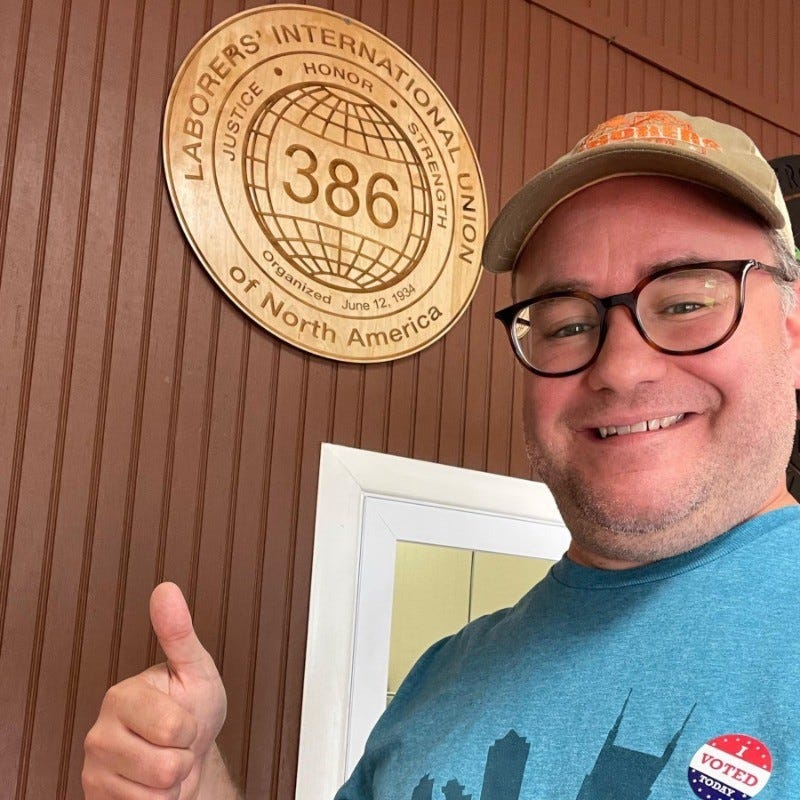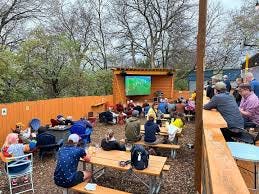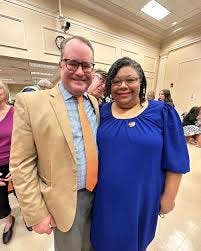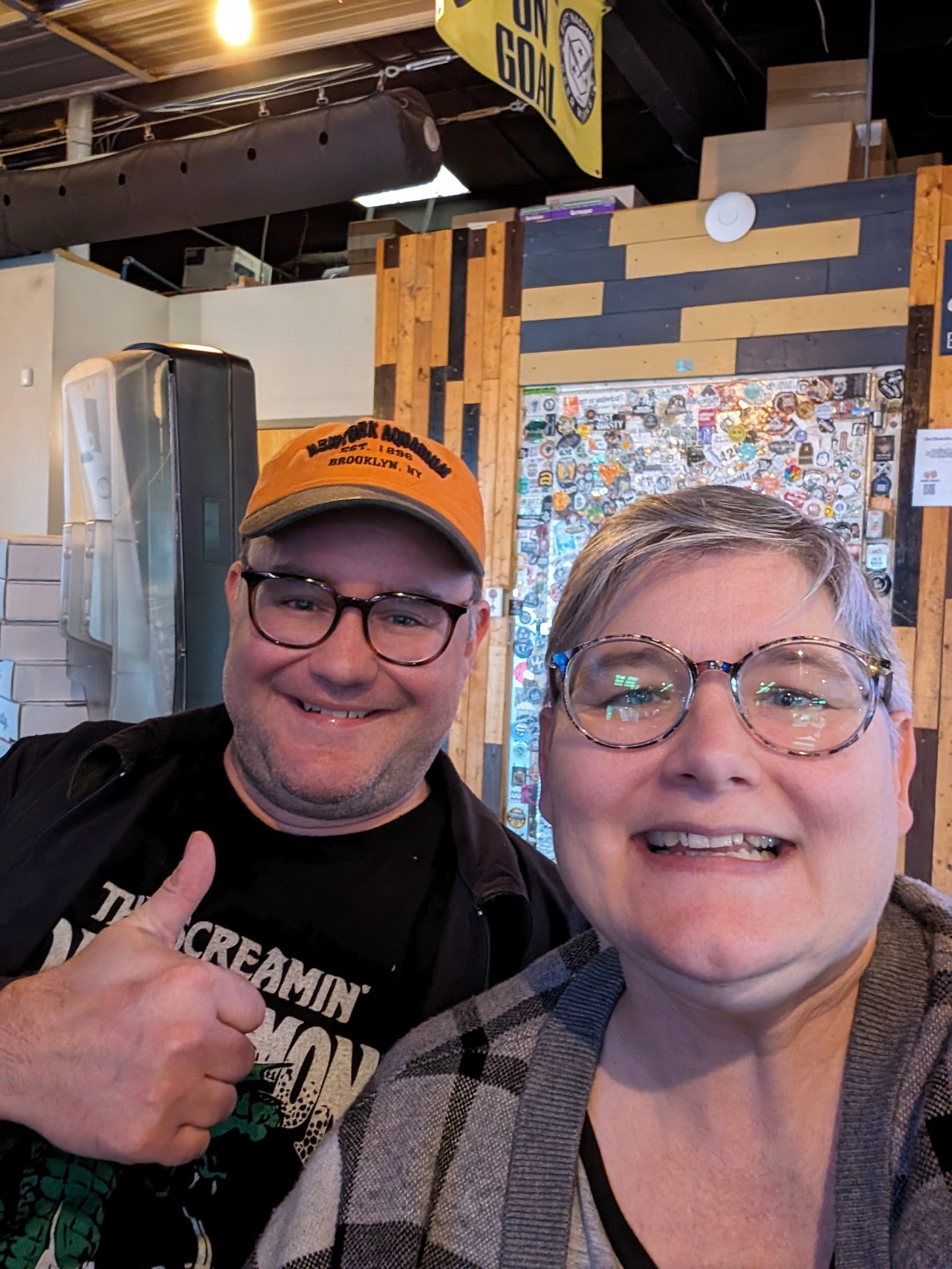Finally Friday! Interview with Commission Member Ethan Link
Ethan is a member of the Civil Service Commission. We met at East Nashville Beer Works.
Welcome to a new version of Brewing Civic Leadership. Today I’m offering a completely new perspective, not a Council Member but a Commission Member. Someone I am quite proud to know and who I love sharing a birthday with! Read and learn about his incredible journey and service below!
Why did you pick this place?
I’ve got a lot of fond memories here and it's a place that people of like minds tend to congregate. I usually run into people that I want to run into here, which is nice. My best friend in the world, David Rutledge, had his wedding here. We have a long, great friendship with Anthony Davis and he's just done a great job creating community here. It's a place where I always feel comfortable and always like who I run into.
And what did you order?
I got me the Nashville Pils, since spring is here. I like a crisp light beer, so that's what we went for.
How do you serve Metro?
In my Official capacity of serving Metro, I am a Civil Service Commissioner. The Civil Service Commission basically does two main things, and a few other smaller things, but it mainly sets the rules by which people are employed by Metro under the Civil Service Regulations and then it regularly sets the Nashville pay plan (the pay plan for all Metro General government employees, firefighters and police). Then before that, and still today, I'm just a very engaged Metro policy watcher. I got involved in several Council and Mayoral campaigns over the last 15 years. I've been on the commission since I believe 2015. I just got reappointed to my third five-year term.
Who are you when you're not serving Metro?
Well, I've got an amazing partner and two wonderful kids - a five-year-old and a two-year-old that I spend a lot of time with. After that, I'm a labor representative. I mainly spend a lot of my time trying to negotiate contracts for construction workers and Vanderbilt service employees. I represent them to Metro governments and across the southeast - Tennessee, down to Florida, Louisiana, over to South Carolina. I spend most of my time in between Nashville and Brownsville right now because of the Blue Oval Plant. Labor for me is kind of like my church, it's where I go for community, and that's where I go for purpose. Going to our local labor union meeting every month is the closest thing I've got to a congregation.
How did you discover that you're a leader?
I'm sure that I'm not the first person to reject that description. When there are complicated or difficult situations, sometimes people will ask my opinion about it and that surprises me often. But I guess that is an indication to me that folks care something about what I thought. Or if somebody asks me to give my opinion to a third party or speak up when I'm not speaking up, that's an indication that folks want to hear more of what I say. I've tried to do a better job of stepping back rather than stepping forward recently, but I find that people sometimes still want to know what I think so I appreciate that. It's an honor to try to help when situations are difficult.
What other areas of life have you had leadership roles?
I've got the itch that a lot of people who are organizers have. When somebody says, “well, who's gonna take notes?” or “who's going to coordinate logistics for this event?” or “who's going to write this?” and nobody raises their hand, after a few seconds, I get the itch to raise my hand. I know other organizers feel the same way. I see that in other people and recognize that as an instinct to want to make things work when they're not necessarily going to get off the ground. It’s an instinct to want them to go forward. I guess that's the Instinct that Draws me to do something like this.
Which is what led you to lead in Metro as a commissioner?
I started my career in organizing at SEIU 205. It was to pass the Affordable Care Act in 2008-2009. I realized in that work that I found a lot of value in challenging power structures that needed to be challenged. Not necessarily, overthrowing them but testing when they needed to be tested for public good. Really that campaign to pass the Affordable Care Act and the actual passage of that and all the people who got served by that (as incomplete as it was), I've been kind of chasing that purpose ever since. So it's like, “Well, what can I do to further that cause in the future?” I went to work for the laborers union about 13 years ago and that's a construction union. The issues of LiUna don't come before the Civil Service Commission, so there's no conflict of interest. We had an opportunity to bring a labor perspective, which is in the code that creates the Civil Service Commission, there's a seat set aside for a labor representative. One of my elder brothers in the movement, Michael Allen was retiring from the Civil Service Commission and from other posts, and I reckon a couple of folks mentioned me to Megan Berry as somebody to consider for the post and she nominated me and the rest is history.
When I joined the commission I didn't know a whole lot about the rules. I knew roughly about the pay plan and that's what I was most interested in. But then I also came to understand all of the rules of discipline for Metro employees and to make sure they were being treated fairly, making sure that we have the best employees and those employees are being rewarded and were being protected, particularly from political circumstances (which is the reason the Civil Service code exists is to protect people from the political whims of the day).
So why Nashville?
When I was growing up, I thought I was gonna go far and fast from Nashville. I thought I was not going to be here. I'm from Gallatin. I'm proud of being from here in this area. I just kept being drawn back here by circumstances. I did organizing in Louisiana for a brief time. Met my now partner there, but we didn't get together till we moved to Nashville. I just love the city. I love the community. I love that despite some of the challenges we've got and growth, there are as a core of people that are very committed to the soul of the city. I haven't been to another place that has the network of really committed residents - folks that are just really connected to their neighborhood and community. I find that it's hard to maintain that when there's so much capital inflow and investment happening. A lot of times that changes the character of a city really quickly, but folks in Nashville have hunkered down. I Also feel that there's an optimism that I share in the city.
What keeps you going?
Small wins. I try to always have a big picture goal that I'm working towards, a campaign that I'm working towards, but then also immediate direct service kind of work that I'm doing. Either I'm doing that directly at work or I'm doing that on a board that I'm part of. It's about having attainable, biting off what you can chew - small things like helping somebody with a workers comp case that is gonna take a few months is really rewarding for the median term. And then taking on a bigger campaign passing the local hire amendment to the charter is a bigger campaign. Having a mix of those things keeps me motivated. I've always got to have something in sight to win.
What about your unique leadership is beneficial to Nashville as a whole?
The role I tend to play in groups that I work with is to try to be a glue. I try to get the best out of a really talented group of people that I'm around. So I find myself connecting very smart people together and trying to get them to work together. That's kind of the role I tend to play is connecting people and encouraging them to work together and finding where there's where they can be mutually successful. I also try to mediate when there's tensions and that's kind of the kind of the style of work that I like to do within a group.
You talked a little bit about what you didn't know before you joined the commission, what do you wish you had known before you joined?
I wish I understood more of the judicial procedures. We're a quasi judicial commission so I wish I understood a little bit more about the basics of how legal work functions. I've got friends who are lawyers, but often just like, depended on them to understand those things and I didn't really understand them well myself. Understanding rules of legal procedure when it came to dealing with discipline cases and appeals would have been something I wanted to understand a little better. I understood kind of parliamentary procedure pretty well from when I was involved in YMCA Youth In Government at a young age. I was well trained on some parliamentary stuff after watching the council and watching how those things work. But I didn't really understand how a quasi-judicial body functions. That would have been helpful to them, but I've learned. I think we have three out of five of us on the commission are lawyers and so I've learned from all of them.
What's the biggest lesson you've learned serving on the commission?
I come from a worker advocacy perspective and that sometimes is the role that I serve on the commission is to be that voice. That is what I see as being my purpose. However, what I've really learned is that contracts work both ways. There are responsibilities and expectations that Metro's MOUs and civil service rules expect of employees to provide the best services that our city can offer. Sometimes folks are dissatisfied with an outcome and really what they want is to be heard. Ultimately they might have an appeal where they really just want to be heard. And sometimes they have appeals that have a lot of merit to them and need to be acted on. Understanding that there's lots of different reasons that people have to want their case heard and understanding that there are lots of different ways that you can approach that.
What advice would you give someone who wants to get started engaging with Metro?
I would say the most obvious thing is to start watching the public access channel and watch the proceedings. Pick out a couple of people that you admire on a board of commission and just ask them to go to coffee and get to know them because most folks are volunteers to these positions. Even council members are practically volunteers, they don't get paid very much and they spend a long time on stuff. I find that most people who are on the board of commission or serve in leadership in Metro have a servant leader mentality and so they, a lot of times, jump at the chance to have a cup of coffee with somebody and explain how it works. Not infrequently, they might be looking for the person to take their spot. That's not an advertisement, that's just something I've noticed.
What question did you think I might ask you that I didn't or that I should have?
Something about who your mentors and influences are and that kind of thing.
My immediate answer is our CLC president Vonda McDaniel. I have learned a lot about servant leadership and how to handle tough situations and how to maintain good relationships broadly. In a government system or a political system that sometimes rewards conflict, how to make sure that you are always maintaining your credibility and your respect of people to the best extent you can.
Anyone else who you would mention?
Freda Player. She was my first boss in labor and has done so much to help so many people. She's somebody that, to me, just proves that when you help lots of people and you encourage other people to be leaders that it all comes back to you eventually. It all comes back to your benefit, so it's the right thing to do and it's also the smart thing to do.
I think Anthony Davis because Anthony has been somebody who was a clear example to me of somebody who can be a supporter of small business and of labor at the same time and he never sacrificed either identity. I wish that there were more folks who follow that example. He's done a lot for the neighborhood and the community.






